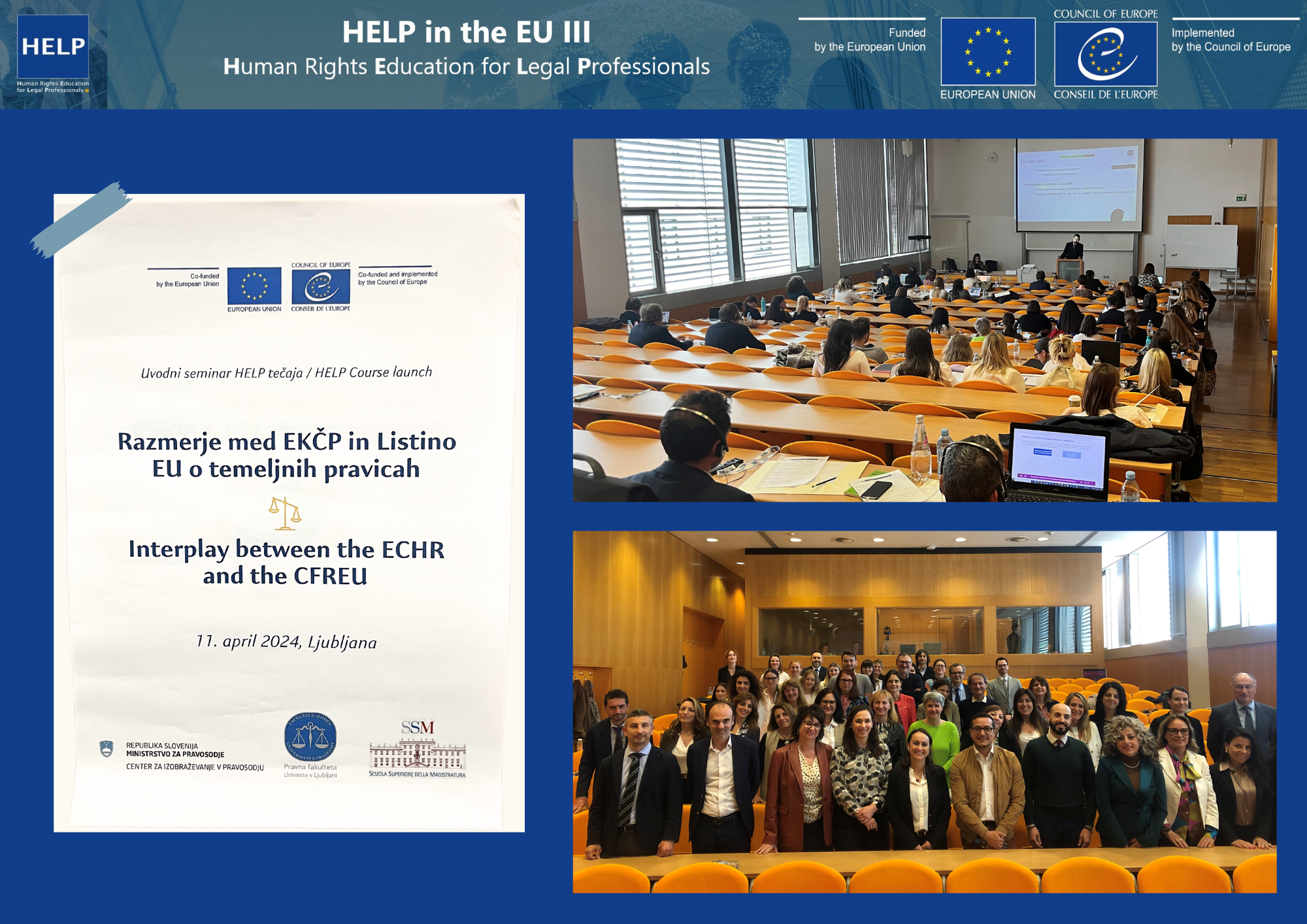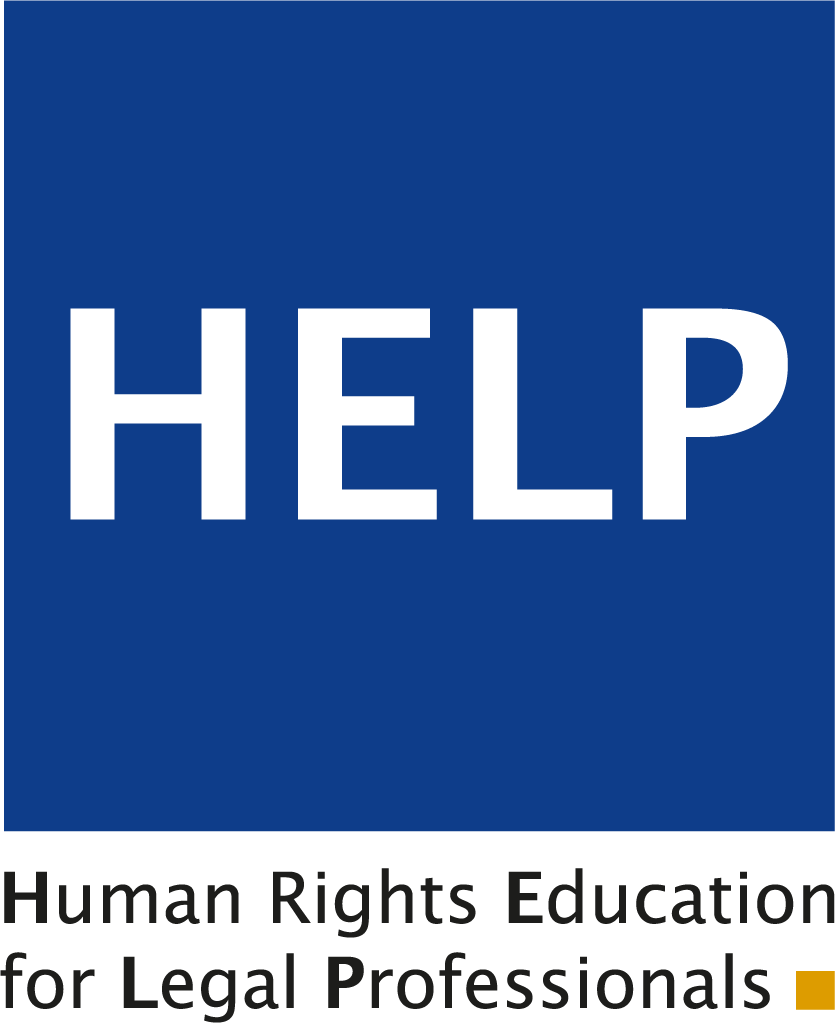On 11 April 2024 sixty judges and prosecutors from Slovenia and Italy attended the launch of the Council of Europe HELP course on Introduction to Human Rights Protection in Europe – the Interplay between the ECHR and the EU Charter of Fundamental Rights.
The event was held at the Faculty of Law of Ljubljana, Slovenia. It was organised by the Council of Europe, in collaboration with the Judicial Training Centre from Slovenia and the School for the Judiciary from Italy, in the framework of the EU-CoE Project “HELP in the EU III” (funded under the European Union’s Justice Programme (2021-2027)).
The launch began with introductory remarks from Miodrag Đorđević, HELP Focal Point for Slovenia and President of the Supreme Court of the Republic of Slovenia. He welcomed the participants, talked about the collaboration with the Council of Europe and described how HELP courses have been used constantly to train legal professionals in Slovenia. He also mentioned the successful collaboration with the Faculty of Law, whose staff, also often staff of courts, are involved in the launch and implementation of the HELP human rights courses.
Several interventions relevant for the topic of the course followed. Johan Callewaert, Deputy Grand Chamber Registrar at the European Court of Human Rights, talked about the interplay between the European Convention on Human Rights (ECHR) and EU law. He argued that these legal instruments are sources of mutual inspiration for the Strasbourg and the Luxembourg Courts and that the ECHR sets a minimum level of protection. He also shared some advice for judges and prosecutors working at the national level, addressing topics such as procedural rights in criminal proceedings, freedom of religion and the European Arrest Warrant.
Roland Klages, Référendaire at the Cabinet of M. le Premier Avocat Général Maciej Szpunar of the Court of Justice of the European Union (CJEU), complemented Joan Callewaert’s presentation with information about the functioning of the CJEU and his views on the interplay with Council of Europe instruments. He talked about the EU Charter of Fundamental Rights and about typical situations in which the CJEU deals with matters related to fundamental rights. Both of them expressed trust in a continuous judicial dialogue between Strasbourg and Luxembourg.
In addition, Grega Strban, Professor and former Dean of the Faculty of Law of the University of Ljubljana, Slovenia and Member of the European Committee of Social Rights, examined the relationship between the ECHR, the EU Charter and the European Social Charter in social security law. He was followed by Giuseppe Bronzini, former President of the Labour section of the Court of Cassation of Italy and national expert for the EU Agency for Fundamental Rights, discussed developments in the application of the EU Charter of Fundamental Rights and the dialogue between the two European courts, from a national perspective, combined with examples from the international level.
During the launch event, the participants also got acquainted with the HELP programme and its e-learning platform, which offers over 50 courses on human rights topics. Furthermore, the two groups met their HELP tutors, Jerca Kramberger Škerl, Professors at the Faculty of Law from Ljubljana and HELP tutor for the group from Slovenia and Nicoletta Aloj (judge) and Eleonora Montserrat Pappalettere (judge, seconded at the European Court of Human Rights), HELP co-tutors for the group from Italy. They talked to the participants about their background and interests and presented some insights into the matters to be approached during the course.
The tutors will provide the participants with support and guidance during the following weeks. During the launch event, all participants have been registered on the dedicated course page and are now ready to start the tutored course. HELP certificates, issued by the Council of Europe, the Judicial Training Centre from Slovenia and the School for the Judiciary from Italy, will be awarded to those who successfully complete the course.
******************************************
The HELP course on Introduction to Human Rights Protection in Europe – the Interplay between the ECHR and the EU Charter of Fundamental Rights emphasizes that EU legal and justice professionals involved in protecting human rights need to understand the European setting in terms of standards and applicability of the two main systems in place, namely under the Council of Europe, with the European Convention on Human Rights and the European Social Charter, and under the European Union, with the EU Charter of Fundamental Rights and the relevant EU law.
The two European systems and their mechanisms have substantially evolved towards convergence and interplay and the two European Courts – the European Court of Human Rights (ECtHR) and the Court of Justice of the EU (CJEU) - are actively engaged in a judicial dialogue and draw inspiration from each other. Moreover, the future accession of the EU to the ECHR (currently under negotiation) will come as an accomplishment to the efforts carried over the years to ensuring a thorough and effective human rights protection system in Europe.
The course is primarily addressed at legal/justice professionals (judges, prosecutors, lawyers, court staff), but could also be extremely beneficial to bailiffs, notaries, mediators, legal interpreters and translators, court experts etc. It can also be useful for the training of policymakers, national human rights institutions, as well as civil society organisations, university students, EU/CoE staff or anybody interested on the topic.
This HELP course was developed in 2023 under the EU-CoE HELP in the EU III Project (funded under the European Union’s Justice Programme (2021-2027)). The topics are explored in a practical way by using presentations, interactive screens, knowledge tests and reflective exercises, enabling the users to apply the gained knowledge and skills.
The course is available in self-learning format, which has a duration of 6 hours. While for now it can only be followed in English, translation in several other EU languages is in progress. Upon completion, users can generate their electronic Statements of Accomplishment, in proof of their acquired knowledge and skills.
HELP courses are intended, in the long term, to become an integral part of the overall learning curricula of the national training institutions and/or other competent authorities of the CoE member states and beyond.





